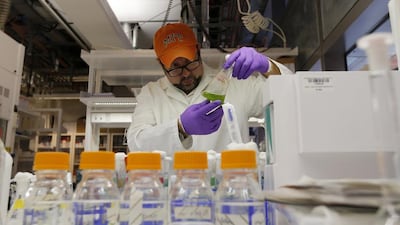It is an exciting time for scientific research and development in the UAE. As the country seeks to expand and enhance the contribution of the knowledge economy to the UAE’s social and economic development there is a growing recognition of the vital contribution of scientific R&D.
The significant social and economic advantages that a country can gain from scientific research occur by design, not by accident. That strategic design is now taking shape in the UAE in the form of updated and enhanced scientific research policies, space programmes, educational reforms and investment in research intensive institutions.
South Korea offers an excellent example of how decades of sustained investment in R&D can transform an economy based on construction and low tech manufacturing to a high-tech knowledge economy – one that is now competing with Silicon Valley as the next global hub for tech start-ups.
As far back as early 2010, I argued in this newspaper for the need for significant expansion in the resources dedicated to R&D in the UAE. Many leading economies regularly invest 2 to 3 per cent of GDP in R&D. Recent figures for South Korea indicate investment at more than 4 per cent, while available figures for the UAE suggest R&D investment at less than 1 per cent of GDP. A vital component for success of the UAE’s R&D endeavours will be the creation of an environment conducive to scientific enterprise and developing and attracting a community of scientific researchers to populate that environment.
Investment in scientific infrastructure is an important precondition for conducting high-level R&D. The materials and equipment for some scientific disciplines are extremely costly. However, infrastructure and equipment is essentially worthless if the scientific expertise cannot be attracted to best use those resources.
The greatest challenge to advancing the next stage in the development of scientific research in the UAE is essentially a human capital challenge. Because of its reliance on expatriate expertise in many fields, the scientific community of the UAE has been transient and somewhat unstable. This is an issue that will need to be addressed as the UAE seeks to significantly enhance its contribution to new knowledge creation and the global scientific community.
I have been researching and publishing for nearly 20 years on the social and organisational context that facilitates scientific discovery and productivity. This research has helped to identify several important characteristics that promote research productivity at the macro and micro levels.
Stability is a key ingredient in many scientific endeavours. Such stability comes in the form of stability of funding, stability of personnel and stability in strategies and priorities. It is not uncommon for leading scientists to spend their entire careers in only one or two academic institutions or research centres.
But stability is not a characteristic of higher education institutions in the UAE. The instability is a natural by-product of the very rapid growth and expansion of education institutions since the foundation of the UAE. Persistent changes in leadership, curriculum, research priorities, strategies and funding have made it difficult for the UAE to attract and retain leading scientific researchers.
Recently the federal flagship university, United Arab Emirates University, where I work as an associate professor of organisational behaviour and human resources management, has taken a strategic decision towards promoting research intensity, revising internal workload policies and incentivising research activities. However, it is too soon to determine the success of these initiatives.
The larger employment context for scientists in the UAE is also in need of careful examination.
Scientists are known for the value they place on intellectual freedom but they also place great value on the freedom to easily collaborate and interact with other stimulating colleagues. The current employment structures and visa regulations of the UAE provide an employer with a large degree of control over who, how and when their scientific personnel might engage in collaborations. While such controls are in place for good reason in a traditional economy, the potentially unnecessary restrictions they place on the interactions of knowledge economy with workers and scientists may need to be considered.
The management and reward of research scientists is also an important consideration that will require an evolution in management practice within UAE institutions. Traditional approaches to incentivising university-based scientists in the UAE have been largely financial. The expatriate model, which has helped to fuel the UAE’s growth, has been a transactional one, where labour, services and expertise are exchanged for financial compensation.
Research on scientists has consistently shown that while it is important to provide competitive remuneration to attract the necessary expertise, the primary motivation of scientists is not financial. What motivates high-performing scientists more than anything else is the opportunity to engage in challenging and stimulating scientific endeavours. It is the joy of the activity itself, and the intellectual challenge that it offers, that is central to the motivation of high-performing research scientists.
Essentially, motivating scientists requires a focus on internal/intrinsic motivators rather than extrinsic/financial motivators.
Creating such an environment is not necessarily easy. Research intensive institutions of the UAE will require a restructuring of organisational policies and practices that facilitate and promote an environment of intellectual curiosity, challenge and freedom. This endeavour will require the further enhancement of organisational cultures that recognise and reward excellence ahead of compliance, foster and promote collaborations nationally and internationally, remove administrative bureaucracies that seek to restrict and command rather than facilitate and promote, and enhance individual autonomy and accountability ahead of control and conformity.
Such conditions, when attained, will enable a stable and productive scientific community and nurture the next generation of UAE national scientists to meet the lofty aspirations of the UAE’s scientific programmes.
James Ryan has been researching scientists and their work environments since 1999

